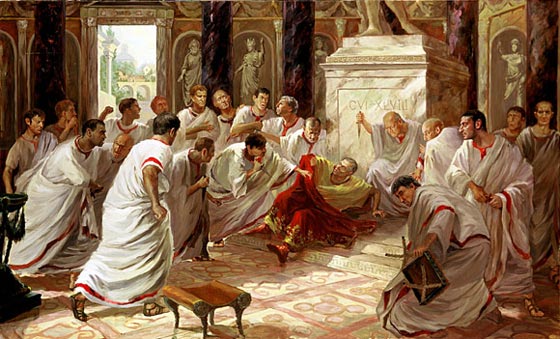THE ASSASSINATION OF JULIUS CAESAR (March 15, 44 BCE)
LOCATION: The
Theater of Pompey in Rome
PERPETRATORS:
Cassius, Brutus and a group of 60 other Roman senators
ANTECEDENTS: The expansion of the Roman
Republic had generated huge wealth. Caesar appears to have judged that he could
restore his family's wealth by entering the political arena.
After the conquest of Gaul in 51
BCE, Caesar became the governor of the three Roman provinces to the north of
Italia, thus oiwer base was considered a threat by a group of senator known as
the Optimates. Pompeius Magnus agreed with the Optimates.
By the time, March, 45 BCE,
Caesar was well established as the most powerful man in Rome.
The senators resolved to act
before Caesar left Rome toward a military campaign. It is thought that as many
as 60 senators were involved.
As Caesar arrived to the meeting
hall a crowd of senators gathered around him to present him a petition. While
Caesar was dealing with the petitioner, one of the senators struck Caesar from
behind
OUTCOME: In his
will, Caesar named his 18-year-old great-nephew Gaius Octavian as his heir. At
first Antony, Octavian and other close associates of Caesar came together to
fight a civil war against the forces loyal to Cassius, Brutus and other
Liberators.
Once those forces were defeated, fighting
continued between the former members of the alliance in a series of encounters.
Octavian finally defeated Antony, opening up the way for him to become the sole
ruler. The assassination of Julius Caesar had exactly the opposite to what had
been intended by the assassins.

No hay comentarios:
Publicar un comentario